Divergence of dissatisfaction: why the 'privileged' Left is enchanted by socialism
In 2020, I wrote the below (scroll down) analysis of why Americans vote for Trump. Especially why the working classes have had a sharp turn to the Right and enthusiastic support for the 45th and 47th President. Still recovering from a bad case of Trump Derangement Syndrome that had been declining since 2018 or so, I called for empathy and understanding for these voters. I figure it is only fair that I do the same for the substantial bloc on the Left who are veering toward a different kind of populism; one that embraces the repeatedly failed socialist system.
There are many fascinating sociopolitical trends emerging from the latest chapter of America’s democratic experiment. One of the most striking is the growing appetite for socialist and hard-left ideals, but not among the working poor, as traditionally assumed. Instead, among the educated, urban middle class. These are the people with degrees, MacBooks covered in “In This House We Believe…” stickers, and social media bios declaring their pronouns. They are not the oppressed masses; they are the disillusioned privileged. And yet, they are clamouring for radical systemic upheaval.
This radical shift isn’t driven by material deprivation in the way we have historically understood poverty. Rather, it’s rooted in existential dissatisfaction and a perception of broken promises. The old promise that education, career, and home ownership bring meaning and stability is ringing hollow for many millennials and Gen Z professionals.
This radical shift isn’t driven by material deprivation in the way we have historically understood poverty. Rather, it’s rooted in existential dissatisfaction and a perception of broken promises. The old promise that education, career, and home ownership bring meaning and stability is ringing hollow for many millennials and Gen Z professionals.
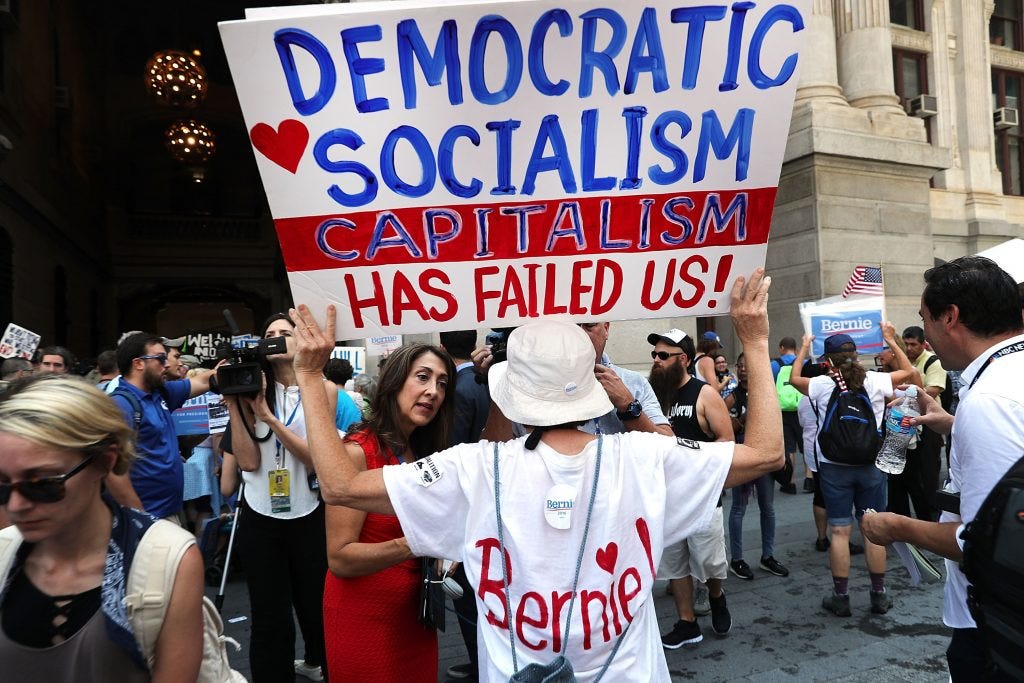
This is the first generation told from childhood that education was the golden ticket. Study hard, go to university, and the world will reward you. But what happens when that story collapses? When graduates leave university saddled with debt, only to find themselves in unpaid internships, precarious contract work, or underemployed in retail and hospitality? The resentment is palpable and not just at the system, but at the perceived betrayal by their parents, teachers, and institutions. The American Dream wasn’t stolen by billionaires, it simply no longer exists for people who were told that a sociology degree would pay the rent.
Housing is another bitter pill. These young professionals, despite their credentials and moral rectitude, are locked out of the property market by a combination of stagnant wages, asset inflation, and restrictive urban planning. They watch as older generations accumulate wealth through passive home ownership while they pour half their incomes into rent for 40 square metres of peeling paint and broken appliances. They are credentialed, indebted, and increasingly angry. And socialism dressed up as romantic, righteous, and redistributive, offers both an explanation and an emotional release. It tells them they’ve been cheated not by a flawed set of choices, but by a rigged system. Whether or not that’s entirely true is beside the point. What matters is that it feels true. And in a political era driven by emotion, that’s enough to turn a once-comfortable class into ideological crusaders.
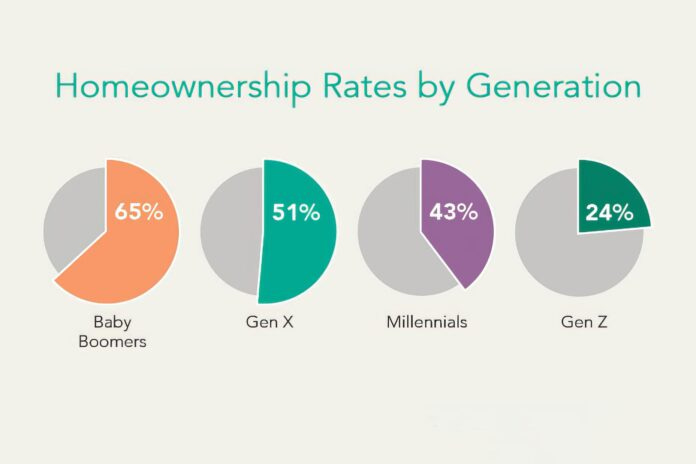
American homeownership
Stuck on knowledge-economy hamster wheels, priced out of housing markets, and surrounded by performative activism and collapsing trust in institutions, they’ve turned toward the alluring faux-clarity of socialism. Like Trump is a symptom, not the cause, the Left’s radical revival is the result of elite rot, not a revolutionary groundswell.
Scroll through X and you’ll find no shortage of Ivy-educated commentators railing against capitalism from their iPhones. They proclaim solidarity with the working class while sipping $7 oat milk lattes in Brooklyn or Berkeley. The irony is lost on them. They see themselves as the new revolutionaries, not factory workers or miners, but media interns, academics, and HR professionals who are emotionally exhausted by what they view as the moral compromises of modern liberal democracy.
In a striking inversion of traditional class politics, it is now the working class (truck drivers, welders, small business owners) who lean conservative, wary of government overreach and inflationary spending. Meanwhile, the educated urbanites cheer for wealth taxes, universal basic income, and de-growth economics. Their ideal society is one where no one is rich and no one offends, but somehow everything still works. But the fact that socialism gains little ground in actual blue-collar communities should give pause to those who claim to speak on their behalf from university lounges and Zoom calls.
What we’re seeing is class inversion in politics. The Left is no longer the party of coal dust and calloused hands, it is the domain of English majors, digital marketers, and TikTok activists. They want universal health care and student loan forgiveness, but also censorship of “problematic” views, institutionalised speech codes, and climate policies that devastate rural economies while letting urbanites signal virtue.
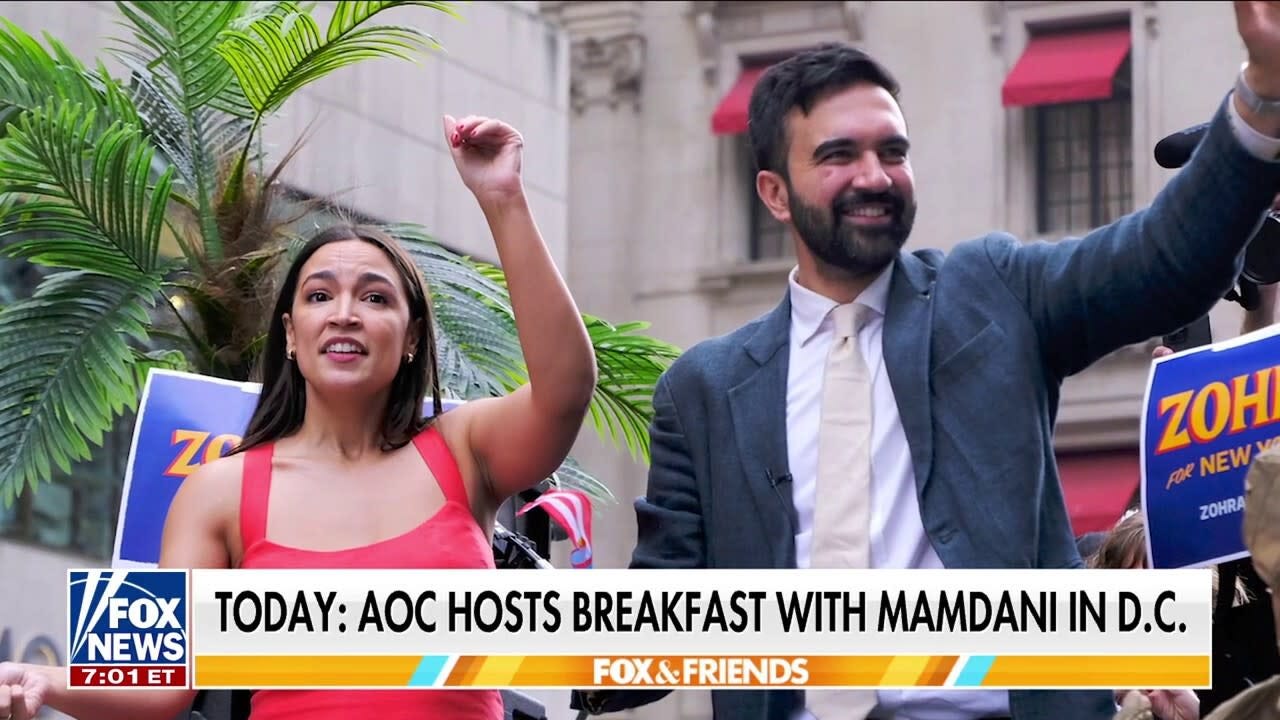
The educated middle class’ love affair with socialism may not be about helping the poor, and definitely is about alleviating guilt, performing morality, and exercising control, but it is more complex than that too. Feeling virtuous in a chaotic world offers the illusion of justice and order, even as socialism’s historical record (Venezuela, the USSR, Cuba etc) warns otherwise. But obscuring these failures is the repackage of socialism as “democratic” or “intersectional,” confident that this time it’ll work because they are in charge.
What makes this more complex and yet more easy to understand, is that there are real injustices to confront. Skyrocketing inequality, corporate monopolies, stagnant wages; these are legitimate concerns. But the solutions being offered in the form of centralised control, wealth redistribution, and thought policing create more problems than they solve.
The conservative movement must reckon with this too. It cannot simply dismiss the rising popularity of socialism as youthful naïveté or academic nonsense. There is something deeply broken in our economic and social systems when the most materially comfortable generation in history is so convinced that everything must be burned down. The Right must articulate a compelling vision for the future that is rooted in opportunity, dignity, and innovation, without slipping into oligarchy or cultural resentment.
70 million deplorable monsters
First published Nov 12, 2020
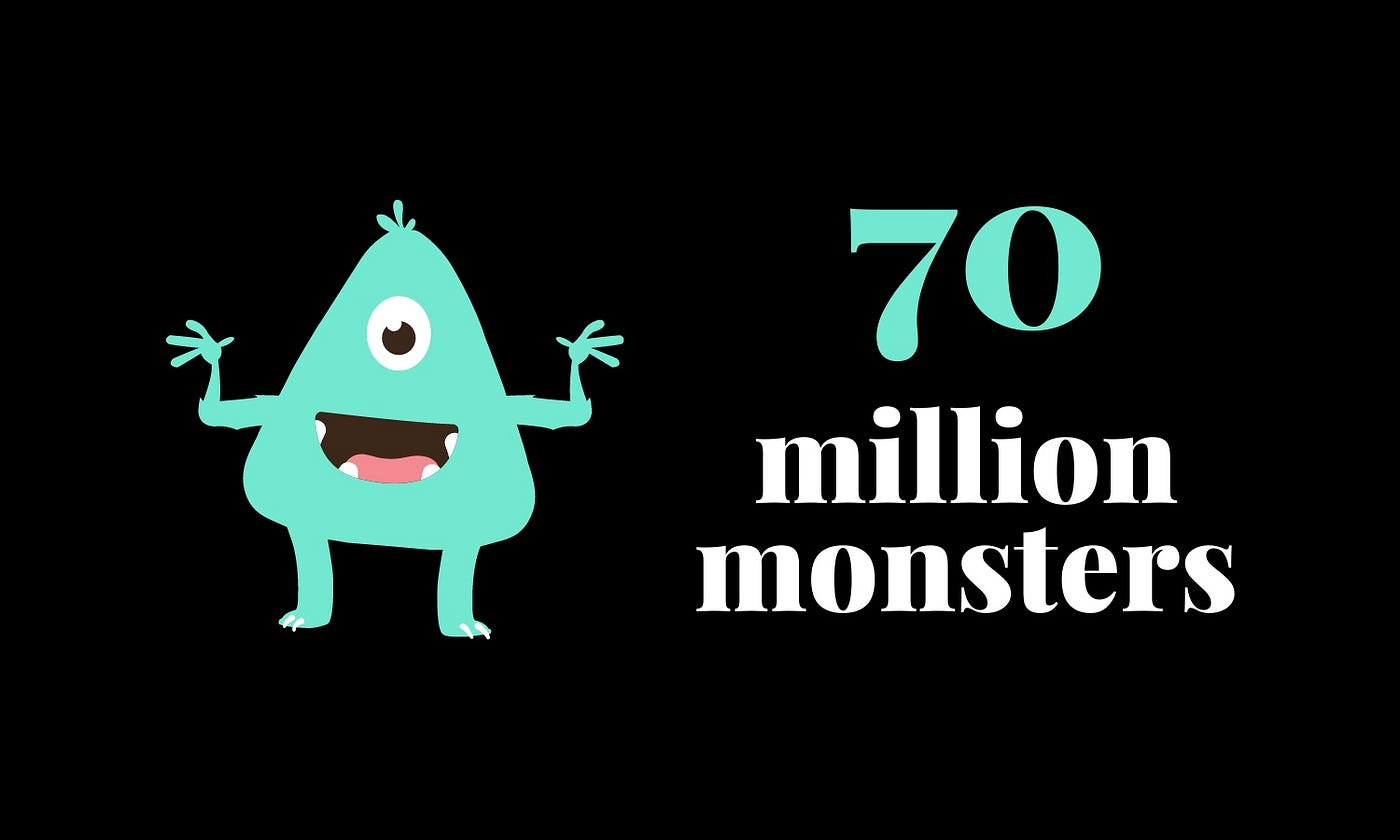
There are many interesting political narratives to be explored in this predictably contentious US election. Pollsters once again proved to be entirely out of touch with the American public and some 70 million people voted for the man the media has spent four years treating as a hostile agent. And so, I find myself, again, pushing back on attacks on those 70 million Trump voters. I refuse to see such a huge number of people as a homogenous group of bigots, racists, and selfish idiots. In my opinion, Trump is the symptom, not the cause.
Once again Democratic voters took to social media to express incredulity that anyone could possibly vote for the ‘Orange Facist’. They called half of their nation “monsters” and called for any family or friends who voted for Trump to ‘unfriend’ them immediately. The ever-widening chasm between those who vote for Trump & those who see him as an existential threat now seems an impassable gulf.
Ru Paul’s Drag Race who won “Ms Congeniality” of his season.
He has 282,000 followers on Twitter.
Typically, news articles have already been published blaming white supremacy and patriarchy for the actions of 70 million Americans. These lazy anti-analyses seek only to reaffirm the existing hatred certain sectors of the US have for those they see as more stupid and morally inferior to them. In fact, Donald Trump increased his vote with all demographics except white men suggesting that the tired identity politics narratives are based not in reality.
Setting aside the Presidential candidates both of whom offered little more than personality politics and ‘at-least-I’m-not-the-other-guy’, one of the most interesting aspects of this election was the outright rejection of the orthodoxy of the Left/Right positioning of the Democrats and Republicans. Regardless of history and policy, this election provided examples of how class affiliation is changing and further supported the notion of a Democrat Party who speaks to an increasingly elitist, academic, media, Hollywood-driven set rather than the working class.
We can look to two states in particular to illuminate the working class rejection of the Democrats despite a retention of classically leftist values. California and Florida couldn’t be more different in their approach to this election. The Californians remained true to form and obedient to the media in voting convincingly for Joe Biden, while in Florida Trump won the electoral votes. There has been substantial interest in the support Trump received from Latino voters and a frankly quite racist backlash against Cubans who were particularly pro-Trump.
However, it is in a couple of referenda that we can see the stark discord between Presidential vote and the traditional politics associated with each Party. In Florida, voters were asked to vote on whether the state should increase the minimum wage to $15 by 2026; an issue primarily affecting the working class and platformed due to activism for workers’ rights. Despite voting for the Republican candidate, Floridians solidly supported an increase to minimum wage. This hardly denotes a population of selfish morons who vote against their best interests. By contrast, the Biden-loving Democrat-voting Californians voted against providing Uber (and alike companies) drivers with employee status. They were given the opportunity to support workers over profit by preventing capitalist gig-economy companies from exploiting workers as “contractors”, and they chose to back capitalism.
It seems that it is no longer so simple as to position voters according to values and policy-support on the Left/Right spectrum and expect them to vote for the Party that purports to occupy that space. It isn’t even relevant if the Parties themselves have shifted in politics, though that is perhaps something worth exploring. What is interesting here is the behaviour of voters and how that behaviour reflects conflicts between their values and their voting habits.
While the Republican Party will need to spend time reflecting on who they are post-Trump, Democrats equally have a lot of soul searching to do. Primarily they need to question why so many working class and poorer Americans saw a Republican candidate as a better option than the Democrat. They need to realign their priorities to better reflect the actual concerns of Americans. Exit polls showed that COVID-19 was usually only third on the list of issues the American people were most concerned about. The economy topped the list.
Support for lockdowns and COVID-19 hysteria appear to be a uniquely elitist position as for most Americans working from home is simply not possible. These people have either lost their jobs due to lockdowns or they have continued to work through them in service jobs. They’ve been the ones on the frontline at most risk of infection and receive none of the intended protection of the lockdowns but most of the worst consequences. Trying to get on with their lives as best as possible, they’ve endured the narratives of “COVIDiots” and “red-neck” non-compliance to mask wearing and other restrictions. Is it really surprising they don’t want to vote for the guy promoting more intense restrictions and ignoring disastrous economic outcomes for the working class?
It is vital that we look beyond the crass and unlikeable nature of Donald Trump. He is a polarising figure and will be remembered as a spectacularly chaotic President. Painting each of the 70 million Trump voters as supportive of every statement and action he has made and as if they’re clones of him and his worst failings, is unfair and unhelpful. While there are many rabid Trump supporters who are as entitled to their fawning over Trump as those who salivate over the flawed and senile Joe Biden, the ‘shy Trump voters’ that pollsters ignored came out in droves. These are people who most likely saw each of Trump’s flaws and still saw him as a lesser threat than Biden. It is this that Democrats must reckon with.
It seems Joe Biden will win the Presidency, but it will be a sour victory for Democrats. Expecting a landslide against Trump, they instead experienced somewhat of a backlash themselves. It should not have been difficult to beat a candidate so thoroughly maligned by media and elite institutions, but the result of the election is exceptionally close. If they are to unify the country, Biden and the Democrats must address the sentiment coming from working class and poor Americans. Ignoring them once more in favour of divisiveness in the form of identity politics and name-calling will only result in more hostility.
Ani O'Brien comes from a digital marketing background, she has been heavily involved in women's rights advocacy and is a founding council member of the Free Speech Union. This article was originally published on Ani's Substack Site and is published here with kind permission.
Typically, news articles have already been published blaming white supremacy and patriarchy for the actions of 70 million Americans. These lazy anti-analyses seek only to reaffirm the existing hatred certain sectors of the US have for those they see as more stupid and morally inferior to them. In fact, Donald Trump increased his vote with all demographics except white men suggesting that the tired identity politics narratives are based not in reality.
Setting aside the Presidential candidates both of whom offered little more than personality politics and ‘at-least-I’m-not-the-other-guy’, one of the most interesting aspects of this election was the outright rejection of the orthodoxy of the Left/Right positioning of the Democrats and Republicans. Regardless of history and policy, this election provided examples of how class affiliation is changing and further supported the notion of a Democrat Party who speaks to an increasingly elitist, academic, media, Hollywood-driven set rather than the working class.
We can look to two states in particular to illuminate the working class rejection of the Democrats despite a retention of classically leftist values. California and Florida couldn’t be more different in their approach to this election. The Californians remained true to form and obedient to the media in voting convincingly for Joe Biden, while in Florida Trump won the electoral votes. There has been substantial interest in the support Trump received from Latino voters and a frankly quite racist backlash against Cubans who were particularly pro-Trump.
However, it is in a couple of referenda that we can see the stark discord between Presidential vote and the traditional politics associated with each Party. In Florida, voters were asked to vote on whether the state should increase the minimum wage to $15 by 2026; an issue primarily affecting the working class and platformed due to activism for workers’ rights. Despite voting for the Republican candidate, Floridians solidly supported an increase to minimum wage. This hardly denotes a population of selfish morons who vote against their best interests. By contrast, the Biden-loving Democrat-voting Californians voted against providing Uber (and alike companies) drivers with employee status. They were given the opportunity to support workers over profit by preventing capitalist gig-economy companies from exploiting workers as “contractors”, and they chose to back capitalism.
It seems that it is no longer so simple as to position voters according to values and policy-support on the Left/Right spectrum and expect them to vote for the Party that purports to occupy that space. It isn’t even relevant if the Parties themselves have shifted in politics, though that is perhaps something worth exploring. What is interesting here is the behaviour of voters and how that behaviour reflects conflicts between their values and their voting habits.
While the Republican Party will need to spend time reflecting on who they are post-Trump, Democrats equally have a lot of soul searching to do. Primarily they need to question why so many working class and poorer Americans saw a Republican candidate as a better option than the Democrat. They need to realign their priorities to better reflect the actual concerns of Americans. Exit polls showed that COVID-19 was usually only third on the list of issues the American people were most concerned about. The economy topped the list.
Support for lockdowns and COVID-19 hysteria appear to be a uniquely elitist position as for most Americans working from home is simply not possible. These people have either lost their jobs due to lockdowns or they have continued to work through them in service jobs. They’ve been the ones on the frontline at most risk of infection and receive none of the intended protection of the lockdowns but most of the worst consequences. Trying to get on with their lives as best as possible, they’ve endured the narratives of “COVIDiots” and “red-neck” non-compliance to mask wearing and other restrictions. Is it really surprising they don’t want to vote for the guy promoting more intense restrictions and ignoring disastrous economic outcomes for the working class?
It is vital that we look beyond the crass and unlikeable nature of Donald Trump. He is a polarising figure and will be remembered as a spectacularly chaotic President. Painting each of the 70 million Trump voters as supportive of every statement and action he has made and as if they’re clones of him and his worst failings, is unfair and unhelpful. While there are many rabid Trump supporters who are as entitled to their fawning over Trump as those who salivate over the flawed and senile Joe Biden, the ‘shy Trump voters’ that pollsters ignored came out in droves. These are people who most likely saw each of Trump’s flaws and still saw him as a lesser threat than Biden. It is this that Democrats must reckon with.
It seems Joe Biden will win the Presidency, but it will be a sour victory for Democrats. Expecting a landslide against Trump, they instead experienced somewhat of a backlash themselves. It should not have been difficult to beat a candidate so thoroughly maligned by media and elite institutions, but the result of the election is exceptionally close. If they are to unify the country, Biden and the Democrats must address the sentiment coming from working class and poor Americans. Ignoring them once more in favour of divisiveness in the form of identity politics and name-calling will only result in more hostility.
Ani O'Brien comes from a digital marketing background, she has been heavily involved in women's rights advocacy and is a founding council member of the Free Speech Union. This article was originally published on Ani's Substack Site and is published here with kind permission.


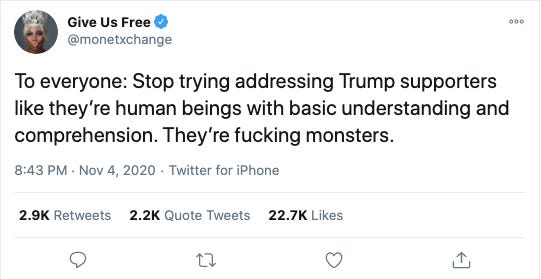
6 comments:
I don't see the American situation as being all that different to what we have here, except that we lack a Fox News equivalent and our right wing politicians are timid. In America, school children are indoctrinated with critical race theory and socialist propaganda like they are in NZ. When they're old enough to vote, most do so on the basis of emotion and peer pressure like young NZ people who vote for the Greens. The left wing media such as CNN, MSNBC is biased but not as bad as Stuff, RNZ, TVNZ, Spinoff etc, but then Fox News is biased on the other side. While Trump may not appeal personally to us, he is strong and puts his country and its citizens first. We had Muldoon.
Socialism/communism will fail again......... simply, it is just being packaged differently notably i.e. wrapped in the inane waffle of kindness and empathy peddled by Ardern.
But socialism has always been driven by the middle class, self identified intellectuals. So certain that only they know the truth. They huddle around their oat lattes, where they openly despise the poor for their ignorance. Yet, it has always been this radical group that has stirred up the poor, using them as canon fodder in the revolution.
What the left doesn't seem to realize is they have become the institution to be overthrown. They have captured the public service, the media and the judiciary. They are in control alreadyband are welding that power. They are the ones that are to be target in the next revolution.
A fascinating read. Thank you Ani.
>" The Left is no longer the party of coal dust and calloused hands, it is the domain of English majors, digital marketers, and TikTok activists."
What I think is missing in this 'new Left' is people with science and technology majors (not to mention economics). The new lefties just haven't got a handle on reality. They live in an artificial fantasy land where their whims can be turned into a new reality in which scientific understanding and reasoning don't count. You've almost got to pity them, poor deluded little snowflakes that they are.
The "ism's" are and have been used to bring in Technocracy, the ultimate slave master AI run government/control system, a digital prison from which there will be no escape.
The democrats made very many foolish judgements including having Harris as presidential candidate. Trump is annoying but he doesn't cackle and doesn't lie quite as much as Harris. Making the abortion , transgender , DEI a big thing was also fatal for the Democrats when the economy is what most people are concerned about.
I haven't met a lower socio -economic person who thought transgenderism was normal . It repels them.
Progressive education , for me is responsible for creating the middle class socialists . This ideologically driven form of education prioritizes indoctrination into socialism. That was Progressivism's main aim right from the beginning. . It is dedicated to cancelling of traditionalist values which include Christian ones. Christianity , despite its many failings frequently gives hope , social cohesion , freedoms , and a belief and confidence you can make a positive difference. in building up society. In contrast Socialism / Marxism leaves you with guilt , despair and bitterness, broken families, a failing education system , lack of freedoms and creates schisms in society.
I would guess Latinos , frequently being Catholics , would favour Trump for his veneer of Christianity which Harris doesn't have. America , has a larger Christian remnant than other English based countries.
Post a Comment
Thank you for joining the discussion. Breaking Views welcomes respectful contributions that enrich the debate. Please ensure your comments are not defamatory, derogatory or disruptive. We appreciate your cooperation.